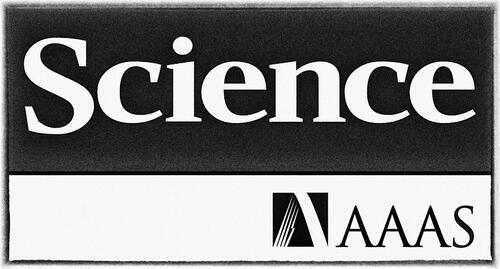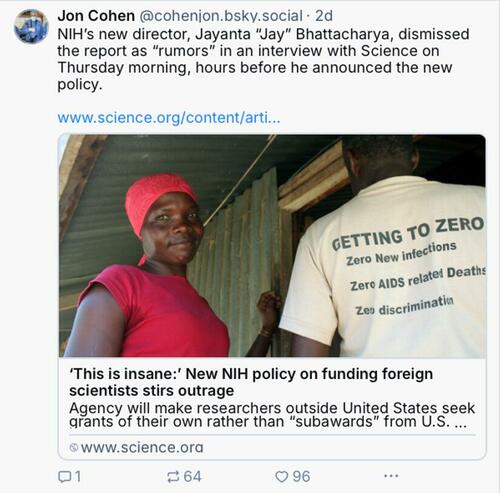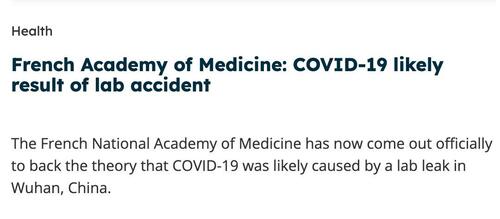Authored by Paul D. Thacker via The DisInformation Chronicle,
“Jocelyn, you know, I just, I’m really uncomfortable with this conversation because you’re like actually spreading rumors that you don’t know anything about.”
The charge from NIH Director Jay Bhattacharya came during an uncomfortable and confusing interview with Science Magazine reporter Jocelyn Kaiser last week. The DisInformation Chronicle is releasing a recording of the interview and a transcript.
During almost 20 minutes of back and forth, Kaiser pressed Bhattacharya several times to account for canceled grants as well as news accounts of turmoil inside the agency, while Bhattacharya asked Kaiser to clarify and explain exactly what she was asking. Kaiser’s interview then ended up in two Science Magazine articles that falsely implied Bhattacharya misled Kaiser about a new policy on NIH grants.
Confusing, contentious exchange
Skipping about in a rambling, meandering path, much of the Kaiser interview concerned reports of problems that Bhattacharya claimed he had fixed in his first month as director. However, a proposed policy to ensure that subawards to foreign universities were better managed seemed to take center stage.
KAISER: Okay, so since you brought it up, kind of skipping around here, but so as you know, as you may not have seen the story. But we had heard it too, that there’s going to be a policy canceling collaborations, foreign collaborations.
BHATTACHARYA: No, that’s false.
KAISER: Is there going to be some sort of policy that…
BHATTACHARYA: There was a policy, there’s going to be policy on tracking subawards.
KAISER: What does it mean?
BHATTACHARYA: I mean, if you’re going to give a subaward, we should be able—the NIH and the government should be able see where the money’s going.
Later in the interview, Kaiser noted that Nature Magazine ran an article on a proposed NIH policy that reported all foreign grants might end.
“I mean, Nature also is spreading rumors, right?” Bhattacharya responded. “There’s no announced policy about, what did you say, like ‘halt foreign collaborations.’ Not true.”
Based upon unnamed sources but headlined as an “exclusive,” Nature Magazine reported that the NIH was threatening thousands of global health projects by ceasing foreign awards to laboratories and hospitals outside the United States. Further down in the piece, Nature reported that it was unclear from sources whether the policy “would apply to all research funds to non-US institutions or only ‘subawards’, which are NIH funds that a US researcher can give to an international collaborator to help complete a project.”
Confusion over whether the upcoming NIH policy would cover all research funds or just subawards continued throughout Science Magazine’s interview, with Bhattacharya telling Kaiser she would have to wait until the policy is announced. “There’s no intent to cancel the foreign collaborations, it’s just not true,” Bhattacharya said. “That’s just a rumor being spread falsely by Nature. And now apparently, I hope you don’t spread it.”
Shortly after the interview, the NIH published their new policy which only covers subawards. “NIH continues to support direct foreign awards,” the policy reads.
“’This is insane:’ New NIH policy on funding foreign scientists stirs outrage,” reported Science Magazine’ headline. Hinting to readers that Bhattacharya lied to Kaiser in his interview, Science Magazine falsely implied that Nature Magazine had reported the upcoming policy would only concern subawards.
Concerns about subaward changes grew earlier this week, with Nature reporting on an apparent draft of the policy on Wednesday, before it was finalized. NIH’s new director, Jayanta “Jay” Bhattacharya, dismissed the report as “rumors” in an interview with Science on Thursday morning, hours before he announced the new policy.
In a post on Bluesky, Science reporter Jon Cohen also implied that Bhattacharya had lied during the interview.
During Kaiser’s interview, Bhattacharya can be heard explaining that changes in subawards were partly spurred by problems encountered with EcoHealth Alliance, a nonprofit run by Peter Daszak which gave an NIH subaward to the Wuhan Institute of Virology. In the last week of the Biden Administration, the Department of Health and Human Services (HHS) debarred EcoHealth Alliance and Peter Daszak from receiving federal funds, in part because EcoHealth Alliance had been unable to provide records from the Wuhan Institute of Virology “in response to NIH’s multiple safety-related requests.”
“You wrote about the EcoHealth Alliance,” Bhattacharya told Kaiser, in the interview.
“I did, yeah. Straight, I mean,” Kaiser responded.
“It wasn’t all that straight,” Bhattacharya replied.
Unfortunately, Science Magazine lived up to Bhattacharya’s characterization with reporting that wasn’t all that straight about EcoHealth Alliance.
Straight out of Science
Science Magazine’s lead reporter on the new NIH subaward policy is Jon Cohen, a science writer with a rather tattered history of ethics. In 2023, Tablet reported that an anonymous whistleblower emailed Cohen “a grenade of an allegation” claiming that the virologist authors of a prominent paper were not the true authors. Published in the journal Nature Medicine, the “Proximal Origin” paper dismissed the possibility of a Wuhan lab accident and was later promoted promoted by Francis Collins in his March 2020 NIH Director’s Blog and by Anthony Fauci during a televised White House briefing the following month.
Here’s Tablet’s report:
Cohen was handed an opportunity that most journalists can only dream of—a potentially career-making scoop dropped in his inbox by a seemingly knowledgeable anonymous source—and a scoop, it turns out, that was in many ways correct. But he never pursued the story.
Instead, Tablet reported, Cohen forwarded the email to the paper’s lead author, who then forwarded it on to Anthony Fauci.
The purple headline for Science Magazine’s piece “This is insane” is a quote ripped from the mouth of Gerald Keusch, a virologist and an emeritus professor at Boston University, with close ties to EcoHealth Alliance and Peter Daszak.
Due to Daszak’s undisclosed ties to the Wuhan Institute of Virology, Columbia University professor Jeffrey Sachs disbanded a Lancet task force investigating the origins of Covid virus in 2021. Specifically, Daszak had not disclosed that several hundred thousand dollars of an EcoHealth Allliance NIH grant had been sent to the Wuhan Institute of Virology as a subaward. Sachs also discovered that emails showed Daszak had orchestrated a February 2020 statement in the Lancet alleging that it was a “conspiracy theory” to argue that the pandemic could have started from a laboratory leak in Wuhan.
Keusch had signed onto Daszak’s “conspiracy theory” Lancet letter and was a co-investigator on an NIH grant to EcoHealth Alliance when Sachs shut the task force down. HHS suspended the EcoHealth grant with Keusch as co-investigator in March 2024, some months before debarring Daszak and EcoHealth Alliance.
Despite this history, Science Magazine quoted Keusch as an unbiased source, who claimed that “no compelling evidence supports the allegation that the virus leaked from WIV.”
A few minutes on Google finds several reports undermining Keusch’s claim.
In the final months of the Biden administration, the CIA assessed that the COVID virus is “more likely” to have leaked from a Chinese lab than to have come from animals. The current CIA director released the report in January. Both British and German intelligence were reported in March to have concluded back in 2020 that the virus likely leaked from the Wuhan Institute of Virology. And the French National Academy of Medicine released a report last month that found “a body of facts and arguments” support the conclusion that he SARS-CoV-2 pandemic originated from a leak at a Chinese laboratory in Wuhan.
Keusch was also caught in a House report released last year coordinating with the NIH’s David Morens to keep EcoHealth Alliance funded and to hide government records of this collusion. NIH scientists are required produce emails and other records under the Freedom of Information Act.
For example, the New York Times reported:
“I learned from our foia lady here how to make emails disappear after i am foia’d but before the search starts, so i think we are all safe,” Dr. David Morens, a former senior adviser to Dr. Fauci, wrote in February 2021. That email chain included Dr. Gerald Keusch, a scientist and former N.I.H. official, and Peter Daszak, the president of EcoHealth Alliance, a virus-hunting nonprofit group whose work with Chinese scientists has drawn scrutiny from lawmakers.
“Plus i deleted most of those earlier emails after sending them to gmail,” Dr. Morens added, referring to his personal Gmail account.
In emails released by House investigators, Keusch and Morens also shared ideas to pressure NIH leadership to fund EcoHealth Alliance. This included writing essays and placing stories with writers Jon Cohen and Meredith Wadman at Science Magazine.
“I did try to get Jon Cohen and Meredith Wadman moving on a new article,” Keusch wrote in an April 2021 email to Morens, “but as you know they both declined at this point because it was not news.”
Some months after attempting to place a story in Science with Cohen and Wadman, Keusch emailed Morens that the Washington Post had rejected an essay he had submitted to defend EcoHealth Alliance. However, Keusch wrote, Science Magazine’s Jon Cohen had helped him find a possible home for the essay at Science and suggested that he also try a columnist at the LA Times.
A few days ago, Kaiser published excerpts of her confusing interview with Bhattacharya. In the article, Kaiser again falsely stated that Bhattacharya had dismissed as rumors “Nature news article reporting that NIH planned to suspend subawards for foreign collaborations.” In fact, Nature had speculated the new policy might end all foreign awards.
“Again, the policy is in process,” Bhattacharya said during the interview with Kaiser. “But the aim of the policy ultimately is so that we can track subawards.”
Click here and scroll down listen to the leaked interview plus transcript…
Loading…





















